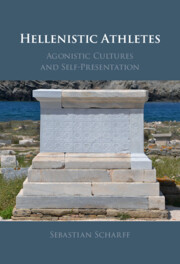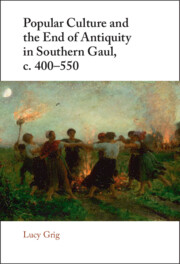Refine search
Actions for selected content:
24618 results in Ancient history
List of contributors
-
- Book:
- Slavery and Dependence in Ancient Egypt
- Published online:
- 01 March 2024
- Print publication:
- 21 March 2024, pp xiv-xvi
-
- Chapter
- Export citation
Frontmatter
-
- Book:
- Slavery and Dependence in Ancient Egypt
- Published online:
- 01 March 2024
- Print publication:
- 21 March 2024, pp i-iv
-
- Chapter
- Export citation
Preface
-
- Book:
- Slavery and Dependence in Ancient Egypt
- Published online:
- 01 March 2024
- Print publication:
- 21 March 2024, pp xix-xxi
-
- Chapter
- Export citation
2 - Pharaonic Egypt
-
- Book:
- Slavery and Dependence in Ancient Egypt
- Published online:
- 01 March 2024
- Print publication:
- 21 March 2024, pp 37-118
-
- Chapter
- Export citation
List of illustrations
-
- Book:
- Slavery and Dependence in Ancient Egypt
- Published online:
- 01 March 2024
- Print publication:
- 21 March 2024, pp x-xii
-
- Chapter
- Export citation
1 - Introduction
-
- Book:
- Slavery and Dependence in Ancient Egypt
- Published online:
- 01 March 2024
- Print publication:
- 21 March 2024, pp 1-36
-
- Chapter
- Export citation
Index
-
- Book:
- Slavery and Dependence in Ancient Egypt
- Published online:
- 01 March 2024
- Print publication:
- 21 March 2024, pp 476-486
-
- Chapter
- Export citation
7 - Byzantine and Umayyad Egypt
-
- Book:
- Slavery and Dependence in Ancient Egypt
- Published online:
- 01 March 2024
- Print publication:
- 21 March 2024, pp 343-431
-
- Chapter
- Export citation
6 - Roman Egypt
-
- Book:
- Slavery and Dependence in Ancient Egypt
- Published online:
- 01 March 2024
- Print publication:
- 21 March 2024, pp 274-342
-
- Chapter
- Export citation
List of maps
-
- Book:
- Slavery and Dependence in Ancient Egypt
- Published online:
- 01 March 2024
- Print publication:
- 21 March 2024, pp xiii-xiii
-
- Chapter
- Export citation
Note to the reader
-
- Book:
- Slavery and Dependence in Ancient Egypt
- Published online:
- 01 March 2024
- Print publication:
- 21 March 2024, pp xxiv-xxiv
-
- Chapter
- Export citation
Aids for the reader
-
- Book:
- Slavery and Dependence in Ancient Egypt
- Published online:
- 01 March 2024
- Print publication:
- 21 March 2024, pp xxv-xxxi
-
- Chapter
- Export citation
5 - Ptolemaic Egypt
-
- Book:
- Slavery and Dependence in Ancient Egypt
- Published online:
- 01 March 2024
- Print publication:
- 21 March 2024, pp 211-273
-
- Chapter
- Export citation
3 - The Late Period
-
- Book:
- Slavery and Dependence in Ancient Egypt
- Published online:
- 01 March 2024
- Print publication:
- 21 March 2024, pp 119-175
-
- Chapter
- Export citation

Hellenistic Athletes
- Agonistic Cultures and Self-Presentation
-
- Published online:
- 16 March 2024
- Print publication:
- 14 March 2024

Popular Culture and the End of Antiquity in Southern Gaul, c. 400–550
-
- Published online:
- 15 March 2024
- Print publication:
- 28 March 2024
-
- Book
-
- You have access
- Open access
- Export citation
Abbreviations
-
- Book:
- Hellenistic Athletes
- Published online:
- 16 March 2024
- Print publication:
- 14 March 2024, pp xiii-xiv
-
- Chapter
- Export citation
Chapter 4 - Athlete and Koinon
-
- Book:
- Hellenistic Athletes
- Published online:
- 16 March 2024
- Print publication:
- 14 March 2024, pp 201-232
-
- Chapter
- Export citation
General Index
-
- Book:
- Hellenistic Athletes
- Published online:
- 16 March 2024
- Print publication:
- 14 March 2024, pp 362-369
-
- Chapter
- Export citation
Copyright page
-
- Book:
- Hellenistic Athletes
- Published online:
- 16 March 2024
- Print publication:
- 14 March 2024, pp iv-iv
-
- Chapter
- Export citation
